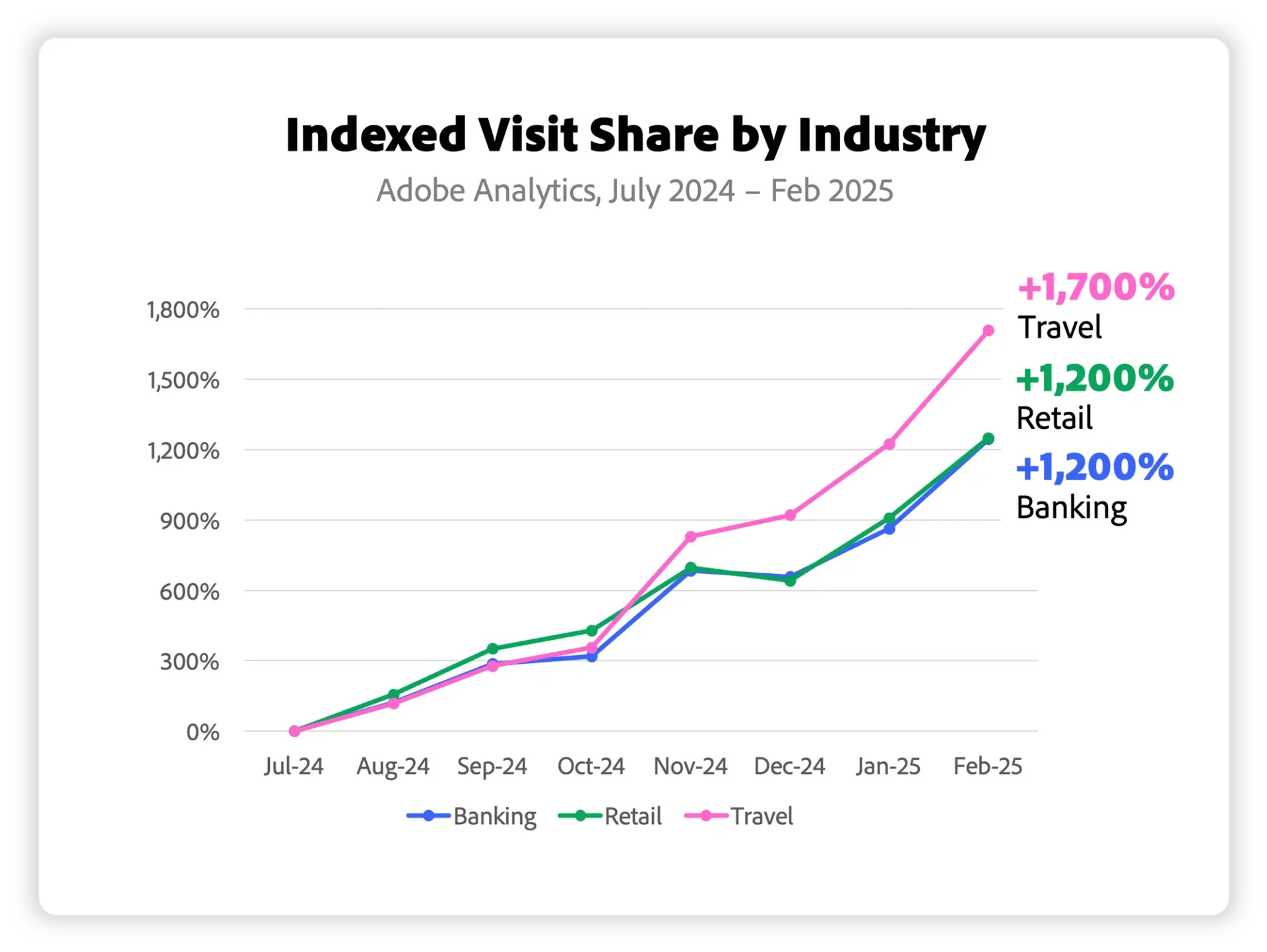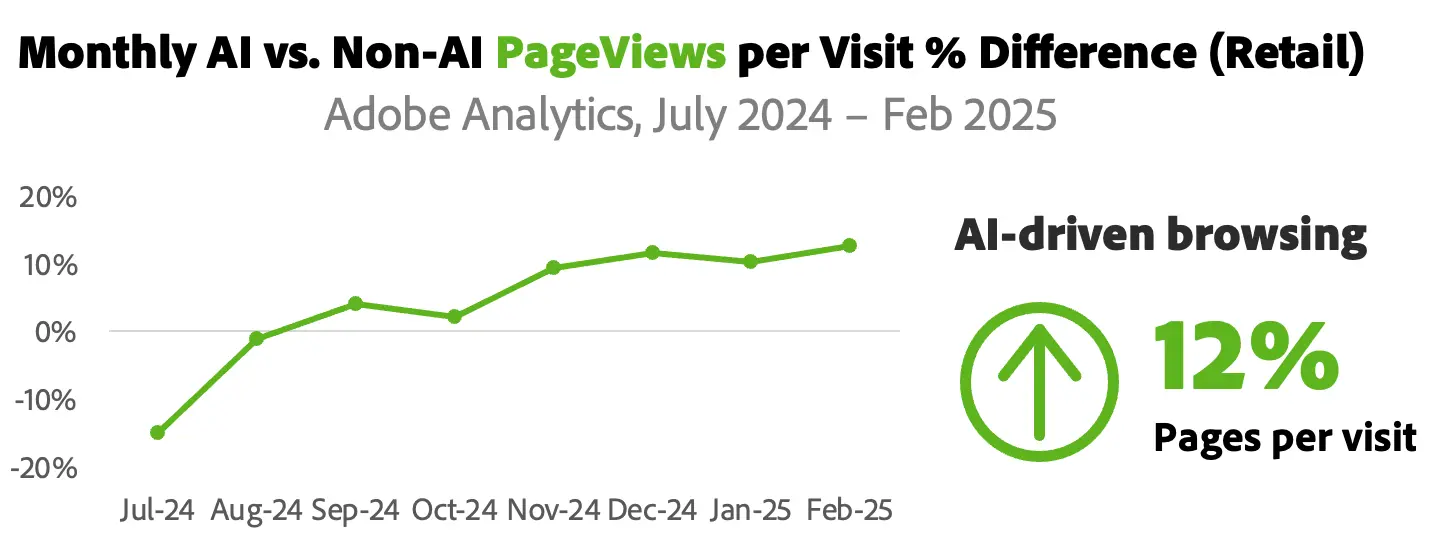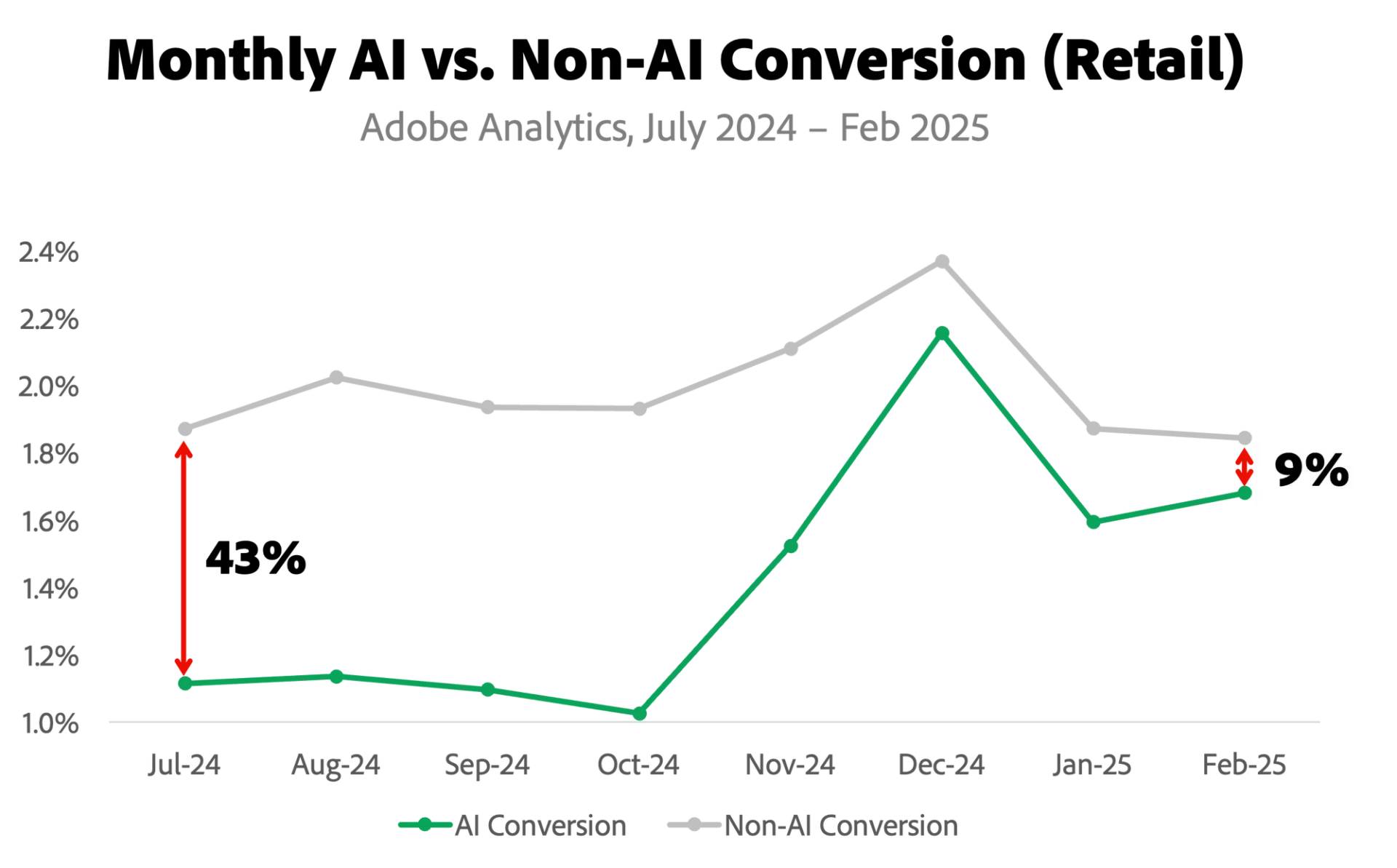The way consumers search for information online is undergoing a dramatic transformation. Traditionally dominated by Google’s “ten blue links,” the search landscape is now shifting toward AI-driven models that offer more intuitive, conversational, and personalized results. According to recent data from Adobe Analytics, traffic to U.S. retail websites from generative AI sources has surged 1,200%, underscoring a fundamental change in how people discover and engage with online content.
Table of Contents
Toggle
This shift is more than just a technological evolution; it reflects growing consumer dissatisfaction with traditional search engines. Concerns over ad saturation, SEO manipulation, and increasingly impersonal results have led users to embrace AI-powered tools like OpenAI’s ChatGPT, Google’s AI Overviews, and Perplexity AI. As AI-driven search becomes more sophisticated, it raises important questions about the future of search engines, the sustainability of online businesses, and how companies should adapt to this rapidly changing environment.
The Traditional Search Paradigm and Its Challenges
For over two decades, Google’s search engine dominance has been built on an algorithmic system that ranks websites based on relevance, backlinks, and SEO strategies. However, this model has increasingly been criticized for several key reasons:
- Advertisement Overload – Google’s search results have become heavily monetized, often prioritizing paid ads over organic links. This has led to frustration among users seeking unbiased information.
- SEO-Driven Results – Websites often optimize content to rank higher in search rather than genuinely answering user queries, resulting in keyword-stuffed pages that provide little real value.
- Declining User Trust – Studies show that users are losing trust in traditional search due to the prevalence of sponsored content and misleading SEO tactics.
These inefficiencies have opened the door for AI-powered alternatives that promise a more intuitive and efficient search experience.
The Rise of AI-Driven Search: Key Innovations
The emergence of AI search tools is reshaping how users interact with digital information. Several companies have taken the lead in this transformation:
1. OpenAI’s ChatGPT
- Conversational Search – ChatGPT allows users to engage in back-and-forth conversations, refining their queries to get highly specific answers.
- Rapid Adoption – ChatGPT reached 100 million users within two months of its launch, making it one of the fastest-growing consumer applications in history.
2. Google’s AI Overviews
- Summarized Responses – Google has integrated AI-generated summaries into search results, aiming to provide direct answers rather than just links.
- Accuracy Concerns – Some early AI-generated responses contained factual errors, highlighting the challenge of balancing AI efficiency with reliability.
3. Perplexity AI
- Trust-Centric Approach – Perplexity AI markets itself as a more reliable alternative to traditional search engines.
- Competitive Positioning – The company’s recent advertising campaign directly challenged Google’s AI missteps, including incidents where Google’s AI suggested using glue on pizza.
The Data Behind the Shift: Adobe Analytics Insights
Adobe’s research reveals the extent of AI’s growing influence on online search behavior:

- Traffic Surge – Between November 1 and December 31, 2024, generative AI-driven traffic to retail websites skyrocketed by 1,300% year-over-year.
- Cyber Monday Impact – The largest online shopping day of the year saw an even more dramatic increase of 1,950% in AI-generated search traffic.
- Consumer Adoption – A survey of 5,000 U.S. consumers found that:
- 39% have already used AI for online shopping.
- 53% plan to do so in the next year.
- Primary uses include research (55%), product recommendations (47%), finding deals (43%), and generating gift ideas (35%).
These statistics highlight that AI-powered search is not just a passing trend—it is fundamentally altering consumer behavior.
Consumer Behavior and Market Impact
Why are consumers gravitating toward AI-powered search? Several key factors explain this shift:
1. Frustration with Traditional Search
Consumers are increasingly frustrated with search engine results cluttered by ads and low-quality SEO-optimized content. AI search models, which provide direct and detailed responses, have proven to be a more efficient alternative.
2. Personalized Search Experiences
AI models learn from user preferences, enabling them to provide tailored recommendations and more relevant information compared to static search results.
3. Faster Decision-Making
With AI summarizing information instantly, users no longer need to sift through multiple websites to find answers, accelerating their decision-making process.
4. Business Adaptation
Retailers and content creators must rethink SEO strategies and adapt to AI-driven search by optimizing for AI queries rather than traditional keyword-based search engines.
Challenges and Controversies
Despite its advantages, AI-driven search presents several significant challenges:
1. Decline in Website Traffic
A major consequence of AI-generated search summaries is the drop in referral traffic to websites. Studies indicate that news sites and blogs relying on search traffic have seen declines of up to 96% in visits.
2. The “Zero-Click” Phenomenon
AI search engines provide direct answers within the interface, eliminating the need for users to click through to external websites. This poses a challenge for businesses that rely on search-driven traffic.
3. Misinformation and AI Hallucinations
AI models sometimes generate incorrect or misleading responses, raising concerns about content reliability and the spread of misinformation.
4. Ethical and Legal Considerations
- Copyright Issues – AI models scrape vast amounts of data from publishers and creators, often without clear attribution or compensation.
- Bias in AI Models – AI search results can reflect biases present in their training data, leading to concerns about fairness and inclusivity.
The Future of AI Search: What’s Next?
As AI continues to reshape the search landscape, several key developments are likely in the near future:

- Hybrid Models – Traditional search engines may incorporate AI-driven responses while preserving organic search rankings to balance traffic distribution.
- Monetization Strategies – AI-powered search engines will need to develop sustainable revenue models that do not rely solely on paid ads.
- Regulatory Scrutiny – Governments and regulatory bodies are likely to enforce stricter guidelines on AI-generated content and its impact on media industries.
- Business Adaptation – Companies must shift toward AI-optimized content strategies, ensuring their information is accessible through AI search interfaces.
Conclusion: The Dawn of a New Search Era
The rapid rise of AI-powered search engines marks a paradigm shift in digital information retrieval. While traditional search engines like Google are far from obsolete, their dominance is being challenged by AI models that offer greater personalization, efficiency, and conversational capabilities. However, this transformation also presents challenges—businesses reliant on search traffic must adapt quickly to remain visible in an AI-driven search landscape.
The key takeaway? AI search is not just an alternative—it is becoming the new standard. Companies and content creators that embrace this evolution will thrive, while those who resist may struggle to maintain relevance in an increasingly AI-powered digital world.




